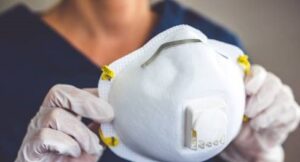 Many US hospitals are continuing to struggle in keeping up with demands for personal protective equipment (PPE) for employees. With Covid-19 continuing to be a menacing presence in the US, the shortage is expected to continue for the foreseeable future. Any expected surges of Covid-19 in the fall or winter of this year could potentially lead to hospital workers being put in needless danger of catching the extremely infectious coronavirus if PPE supplies continue to run low.
Many US hospitals are continuing to struggle in keeping up with demands for personal protective equipment (PPE) for employees. With Covid-19 continuing to be a menacing presence in the US, the shortage is expected to continue for the foreseeable future. Any expected surges of Covid-19 in the fall or winter of this year could potentially lead to hospital workers being put in needless danger of catching the extremely infectious coronavirus if PPE supplies continue to run low.
While many hospitals and research organizations have been conducting testing to figure out effective and practical ways to decontaminate N95 masks for multiple uses, the practice is seen by many as controversial. A new study published in the Journal of the American Medical Association (JAMA) researched various sterilization techniques on N95 masks. As this article by Robert King at Fierce Healthcare explains:
“The study examined the fit of the masks and tested the use of three sterilization methods: vaporized hydrogen peroxide, steam and ethylene oxide. They then bombarded the masks with particles like the size of COVID-19 particles.
Researchers found that a single cycle of sterilization with hydrogen peroxide and ethylene oxide did not lead to any “deleterious effect” on the mask’s ability to filter out particles.
However, there were some downsides to the methods.
“A potential disadvantage of [ethylene oxide] sterilization is that the wearer may be exposed to residual [ethylene oxide] within the face mask,” the study said.
Steam had mixed results.
Researchers used steam on two respirator models. They found that steam visibly distorted the 1860 N95 respirators and made them unsuitable for reuse, the study said.
But 1,870-plus Aura face masks made by 3M were not visibly altered after steam sterilization and maintained more than 95% efficiency in filtering out particles.
The study, however, only looked at the effects of sterilization and reprocessing after one cycle. Some hospitals systems have reportedly been reprocessing N95 masks several times.
The nurses union National Nurses United has slammed the practice of reprocessing, saying that it goes against the manufacturer recommendations.
The union slammed federal guidance from the Centers for Disease Control and Prevention (CDC) and National Institute for Occupational Safety and Health (NIOSH) on reprocessing.
“There is no validated, scientific evidence that multiple re-use or decontamination of N95 respiratory masks is safe, and will protect a healthcare worker from being infected when exposed to a patient with the virus,” the union said in a statement back in April.
The JAMA study also examined whether N95 masks were still useful up to 11 years past their expiration date.
Results showed that even after such a long expiration, N95 masks that had intact headbands still had 95% efficiency at filtering out particles.
It also found that the fit of the N95 mask was critically important. It found that N95s in the wrong size declined the effectiveness of filtering particles down to 90%.
“This evaluation provides quantitative results on which health care administrators, supply chain leaders, and hospital epidemiologists can make evidence-based decisions to protect clinicians and other health care workers during a pandemic or long-term mask shortage,” the study said.”
Read the full article here: Study finds reprocessing N95 masks one time is acceptable alternative if supplies low
For hospitals considering a process to decontaminate PPE to allow for multiple uses during the pandemic, they must have a reliable system in place to make sure they get maximum use out of the PPE without exceeding published guidance. Hospitals should also ensure that employees only are able to check out one mask at a time to ensure adequate supply for all frontline workers. Mobile Aspects is working with select healthcare systems on a novel tracking system to track PPE including N95 masks to make sure that maximum usage is reached without exceeding published guidelines. Contact us via our website to find out more.
